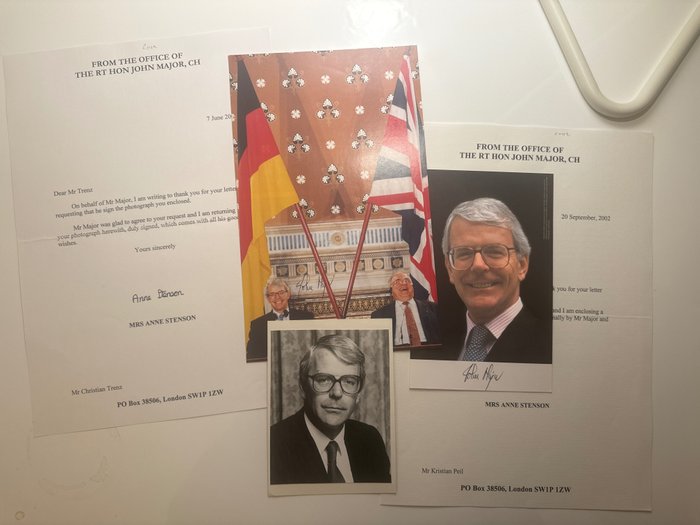
John Steinbeck - 1957 'The Short Reign of Pippin IV'/First Edition/Dust jacket - 1957
編號 81733697

編號 81733697

John Major (born 1943) British Prime Minister - 3 autograph signed photocards, one with German Chancelor Helmut Kohl (but no signature of Kohl)- together with 2 letters signed by his secretary, Anne Stenson, 7th June and 20th September 2002, different sizes.
Sir John Major KG CH (born 29 March 1943) is a British former politician who served as Prime Minister of the United Kingdom and Leader of the Conservative Party from 1990 to 1997. He previously held Cabinet positions under prime minister Margaret Thatcher, his last as chancellor of the Exchequer from 1989 to 1990. Major was Member of Parliament (MP) for Huntingdon, formerly Huntingdonshire, from 1979 to 2001. Since stepping down as an MP in 2001, Major has focused on writing and his business, sporting and charity work, and has occasionally commented on political developments in the role of an elder statesman.
Having left school just before his sixteenth birthday, Major worked as an insurance clerk and joined the Young Conservatives in 1959, and soon became a highly active member. He was elected to Lambeth London Borough Council in 1968 and a decade later to parliament, being elected as the Conservative MP for Huntingdonshire in the 1979 general election. Major held several junior government positions under Thatcher from 1984 to 1987, including parliamentary private secretary and assistant whip. He served in Thatcher's third ministry as Chief Secretary to the Treasury from 1987 to 1989, Foreign Secretary in 1989, and Chancellor of the Exchequer from 1989 to 1990. Following Thatcher's resignation in 1990, after a challenge was launched to her leadership, Major stood in the 1990 Conservative leadership election to replace her and emerged victorious, becoming prime minister. His mild-mannered style and moderate political stance contrasted with that of Thatcher. Two years into his premiership, Major went on to lead the Conservative Party to a fourth consecutive electoral victory, winning more than 14 million votes, which remains the highest number ever won by a political party in Britain.
As prime minister, Major created the Citizen's Charter, removed the Poll Tax and replaced it with the Council Tax, committed British troops to the Gulf War, took charge of the UK's negotiations over the Maastricht Treaty, led the country during the early 1990s economic crisis, withdrew the pound from the European Exchange Rate Mechanism (on Black Wednesday), promoted the socially conservative back to basics campaign, privatised the railways and coal industry, and played a pivotal role in creating peace in Northern Ireland. In 1995, Major resigned as party leader, amid internal divisions over UK membership of the European Union, parliamentary scandals (widely known as "sleaze") and questions over his economic credibility. Despite being reelected as Conservative leader in the 1995 leadership election, his administration remained unpopular, and soon lost its parliamentary majority. The Labour Party pulled ahead of the Conservatives in every local election during Major's leadership, which increased after Tony Blair became Labour leader in 1994.
The Conservatives were defeated in a landslide in the 1997 general election, ending 18 years of Conservative rule. After Blair succeeded Major as prime minister, Major served as Leader of the Opposition for seven weeks while the leadership election to replace him took place. He formed a temporary shadow cabinet, and Major himself served as shadow foreign secretary and shadow secretary of state for defence. His resignation as Conservative leader formally took effect in June 1997 following the election of William Hague. He remained active in Parliament, regularly attending and contributing in debates, until he stood down at the 2001 election to focus on writing and his business, sporting and charity work.
Since leaving office, Major has tended to maintain a low profile in the media, occasionally making political interventions. He supported the Britain Stronger in Europe campaign for the UK to remain in the European Union, and has often criticised Brexit since the outcome of the 2016 referendum. Major was knighted by Queen Elizabeth II in 2005 for services to politics and charity, and was made a Member of the Order of the Companions of Honour in 1999 for his work on the Northern Ireland peace process. Although public favourability of Major has improved since he left office, his premiership has generally been viewed as average in historical rankings and public opinion of British prime ministers.
#C042
condition: good
look to the pictures
we guarantee the origin